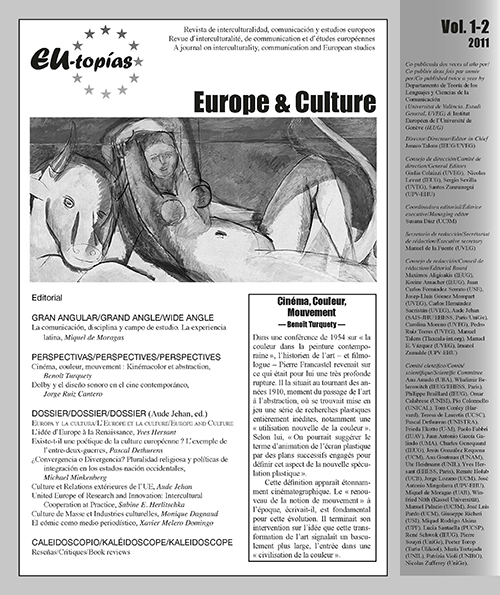United Europe of Research and Innovation. Intercultural Cooperation at Practice
DOI:
https://doi.org/10.7203/eutopias.1.18444Keywords:
Science and technology, innovation, competitiveness, intercultural cooperation, the european research area (ERA), “Lisbon strategy”, “Europe 2020” strategy, framework programmes Abstract
Abstract
With its Framework Programmes for Research, technological Development and Demonstration, the European Union set up – back in the year 1984 – what have become the largest, cooperative as well as competitive research & technology programmes worldwide. Oriented towards the objective of strengthening European competitiveness, the Framework Programmes have evolved into the flagship instrument contributing to the development of a European Research Area, a single European market to the world of Science & Technology – ensuring open and transparent “trade” in skills, ideas and know-how by creating a United Europe of research and innovation. Having brought together around 400.000 researchers teams, several of them repeatedly, from Europe and the world in funded projects, the impact of the Framework Programmes though goes far beyond just providing funding for these projects. Indeed, the key strength of the Framework Programmes is that they have nurtured a culture of cooperation between the best universities, companies, research organizations in Europe and beyond, thus bringing together different actors, sectors, cultures, gender, nationalities, etc. This capability of intercultural cooperation is what Europe has developed and professionalized for over 25 years, which nowadays provides European research communities with what is a key competitive asset and advantage: contributing to solving global challenges by international, thus intercultural cooperation of the best “brains” in science, technology and innovation
 Downloads
Downloads
 References
References
AHO, E., CORNU, J., GEORGHIOU, L., and A. SUBIRÁ (2006). ‘Creating an Innovative Europe’, Report of the Independent Expert Group on R&D and Innovation appointed following the Hampton Court Summit’, January 2006. Luxembourg: Office for Official Publications of the European Communities.
ERAWATCH (2008). ‘Activities of EU member states with regard to the reform of the public research base’; Available at: http://cordis.europa.eu/erawatch/index.cfm?fuseaction=home.downloadFile&fileID=1133
ERAWATCH analytical country reports (2009). Available at: http://cordis.europa.eu/erawatch/index.cfm?fuseaction=reports.content&topicID=600&parent ID=592
ESFRI (2009). ‘European Roadmap for Research Infrastructures Implementation Report 2009’; Available at: http://ec.europa.eu/research/infrastructures/pdf/esfri/home/implementation_report_2009_en.pdf
Europe’s top research universities in FP6: scope and drivers of participation, Luisa Henriques, Antoine Schoen, Dimitrios Pontikakis, JRC Technical Notes, EUR 24006 EN – 2009.
Towards Joint Programming in Research: Working together to tackle common challenges more effectively, European Commission, COM (2008) 468 final.
European Commission (2006b). ‘Delivering on the modernisation agenda for universities: education, research and innovation’, Communication from the Commission, COM(2006) 208, Brussels, 10 May.
European Commission (2006c). ‘Putting knowledge into practice: A broad-based innovation strategy for the EU’, Brussels, Communication from the Commission, COM(2006) 502 final, Brussels, 13 September.
European Commission (2007a). Commission Staff Working Paper, Accompanying document to the Report from the Commission to the Council on the Council Resolution of 23 November 2007 on ‘Modernising Universities for Europe’s competitiveness in a global knowledge economy’, COM(2008) 680 final. Available at: http://ec.europa.eu/education/higher-education/doc/com/sec2719_en.pdf
European Commission (2008). ‘A Strategic European Framework for International Science and Technology Cooperation’, European Commission, COM (2008) 588 final.
European Commission (2008f). ‘Commission recommendation on the management of intellectual property in knowledge transfer activities and Code of Practice for universities and other public research organisations’, Communication from the Commission, COM(2008)1329, April 10. Available at: http://ec.europa.eu/invest-in-research/pdf/ip_recommendation_en.pdf
European Commission (2009i). ‘A new partnership for the modernisation of universities: the EU Forum for University Business Dialogue’, Communication from the Commission, COM(2009) 158, April 2 2009. Available at: http://ec.europa.eu/education/higher-education/doc/business/com158_en.pdf
European Commission (2009j). ‘Reviewing Community innovation policy in a changing world’, Communication from the Commission, COM(2009) 442, 2 September 2009. Available at: http://ec.europa.eu/enterprise/policies/innovation/files/com(2009)442final_en.pdf
European Commission (2010b). ‘New Skills for New Jobs: Action Now’, Report of an Expert Group. Available at: http://ec.europa.eu/social/main.jsp?catId=568&langId=en
European Commission (2010c). ‘Simplifying the Implementation of the Research Framework Programmes’, Communication from the Commission, COM(2010)187, Brussels, 29 April 2010. Available at: http://ec.europa.eu/research/fp7/pdf/communication_on_simplification_2010_en.pdf
European Commission (2010d). ‘Unlocking the potential of cultural and creative industries’, Green Paper, COM(2010)183, Brussels. Available at: http://ec.europa.eu/culture/our-policy-development/doc/GreenPaper_creative_industries_en.pdf
European Commission (2010g). ‘Special Eurobarometer Survey No. 340 on Science and Technology’, June 2010; Available at: http://ec.europa.eu/public_opinion/archives/ebs/ebs_340_en.pdf
European Commission (2010h). ‘Eurobarometer survey No. 73’, Spring 2010; Available at: http://ec.europa.eu/public_opinion/archives/eb/eb73/eb73_first_en.pdf
FERNÁNDEZ-ZUBIETA , A. and GUY, K. (2010). ‘Developing the European Research Area: Improving Knowledge Flows via Researcher Mobility’, JRC Scientific and Technical Report, JRC-IPTS. Forthcoming.
FERRARI, A., CACHIA, R. and PUNIE , Y. (2009). ‘Innovation and Creativity in Education and Training in the EU Member States: Fostering Creative Learning and Supporting Innovative Teaching: Literature review on Innovation and Creativity in E&T in the EU Member States (ICEAC)’, JRC Technical Note 52374, JRCIPTS. Available at: http://is.jrc.ec.europa/pages/EAP/iceac.html
Preparing Europe for a new Renaissance, A Strategic View of the European Research Area, First Report of the European Research Area Board, October 2009.
Realising the New Renaissance, Policy proposals for developing a world-class research and innovation space in Europe 2030, Second Report of the European Research Area Board — 2010.
Downloads
Published
How to Cite
-
Abstract248
-
PDF66
Issue
Section
License
![]()
The authors conserve the copyright. All content published in EU-topías. Journal of interculturality, Communication, and European Studies are subject to the license Creative Commons Attribution-NonCommercial-ShareAlike 4.0 license. The full text of the license can be found at <http://creativecommons.org/licenses/by-nc-sa/4.0>
They may be copied, used, disseminated, transmitted and publicly displayed, provided that:
- The authorship and original source of the publication is cited (journal, publisher and URL of the work).
- They are not used for commercial purposes.
- The existence and specifications of this license of use are mentioned.
It is the responsibility of the authors to obtain the necessary permissions for images that are subject to copyright.



